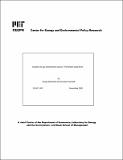| dc.contributor.author | McDaniel, Tanga | en_US |
| dc.contributor.author | Neuhoff, Karsten | en_US |
| dc.contributor.other | Massachusetts Institute of Technology. Center for Energy and Environmental Policy Research. | en_US |
| dc.date.accessioned | 2009-04-03T17:05:08Z | |
| dc.date.available | 2009-04-03T17:05:08Z | |
| dc.date.issued | 2002 | en_US |
| dc.identifier | 2002-007 | en_US |
| dc.identifier.uri | http://hdl.handle.net/1721.1/44988 | |
| dc.description.abstract | When access to monopoly owned networks is constrained auctioning access rights can increase the efficiency of allocations relative to negotiation and grandfathering when there is sufficient competition among network users. Historically, access rights to entry capacity on the British gas network were granted by the monopoly network owner via negotiation; rights were later based on regulated tariffs with an increasing reliance on market based constraint resolution by the system operator. In 1999 an auction mechanism for allocating rights was introduced. Comparing the different allocation methods we conclude that where there is competition at entry terminals auctions have been successful with respect to anticipating spot prices, capturing producer rents and reducing the costs of alleviating network constraints. Moreover, auctions are more transparent and better facilitate entry. | en_US |
| dc.description.sponsorship | Supported by the MIT Center for Energy and Environmental Policy Research. | en_US |
| dc.format.extent | 27 p | en_US |
| dc.publisher | MIT Center for Energy and Environmental Policy Research | en_US |
| dc.relation.ispartofseries | MIT-CEEPR (Series) ; 02-007WP. | en_US |
| dc.title | Auctions to gas transmission access : the British experience | en_US |
| dc.type | Working Paper | en_US |
| dc.identifier.oclc | 52305336 | en_US |
